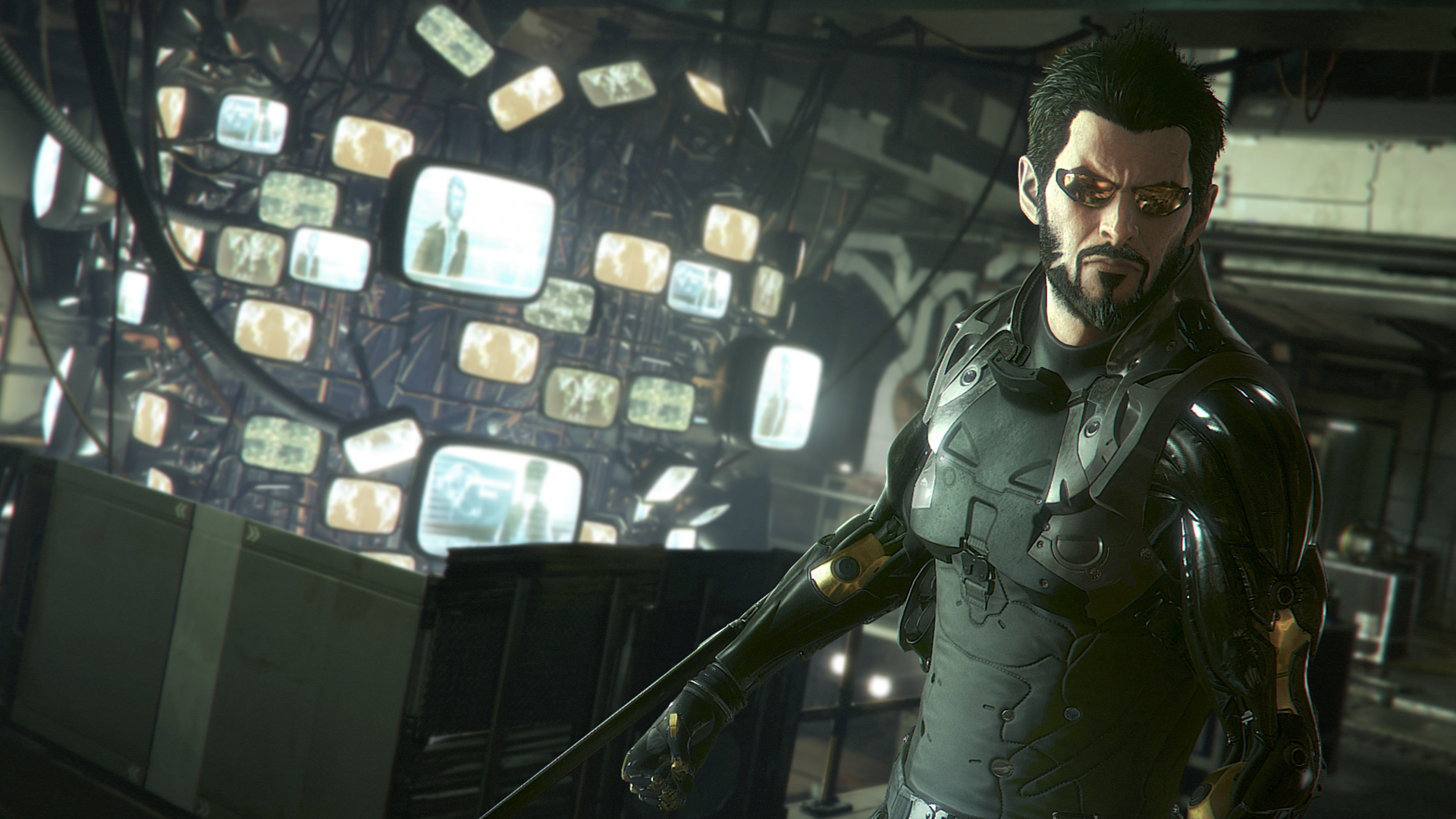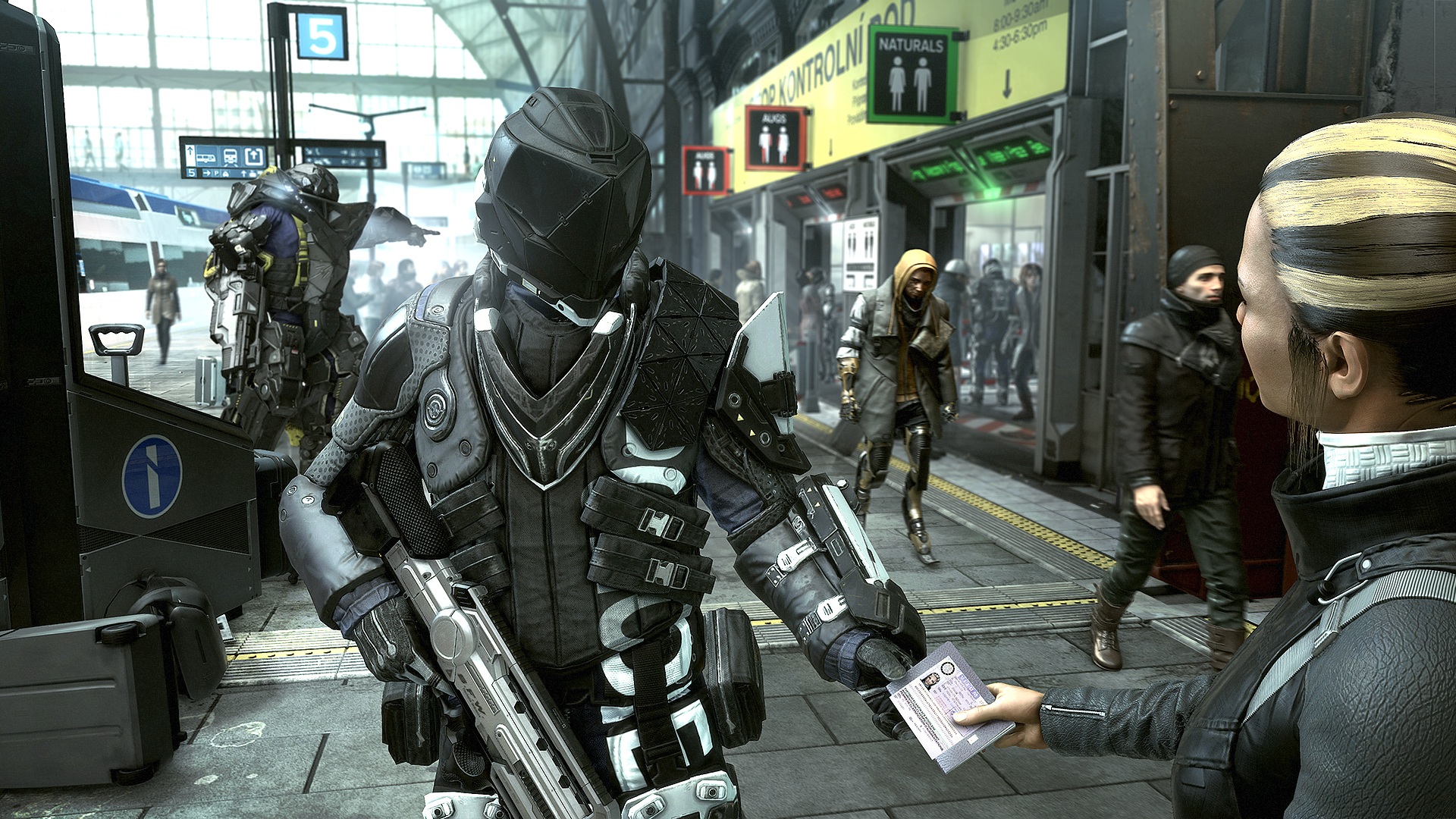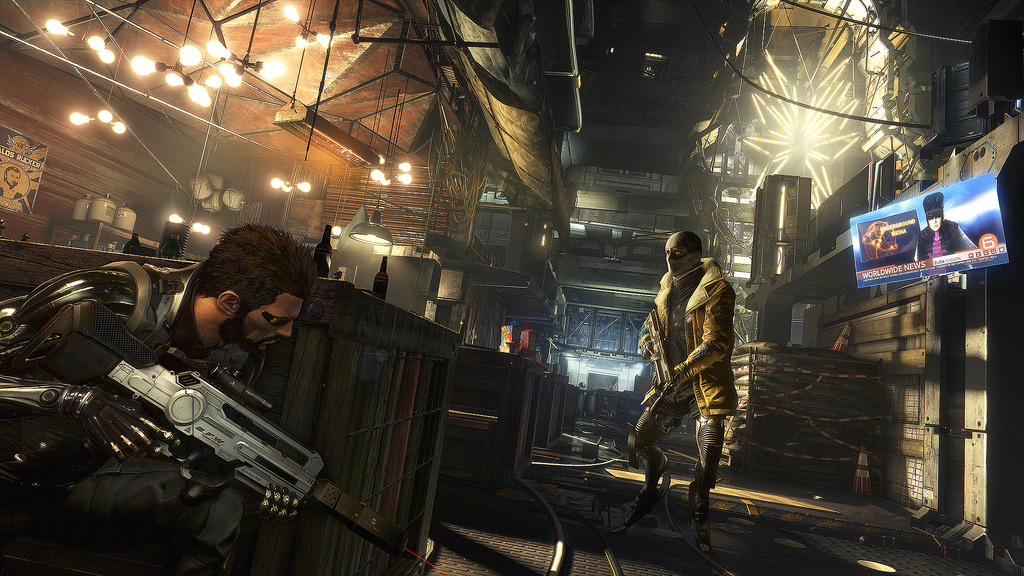Feminist Frequency on Deus Ex: Mankind Divided‘s Outrageous “Black Lives Matter” Appropriation
At least the architecture is nice...?

This post originally appeared on Feminist Frequency and is reposted here with permission.
Adam Jensen, the cybernetically-augmented security expert and trench coat enthusiast from 2011’s Deus Ex: Human Revolution, is back. Set two years after the events of Human Revolution, Deus Ex: Mankind Divided takes place in a world where augmented people find themselves increasingly marginalized and dehumanized, and the game couldn’t be more explicit about drawing connections between the oppression they’re experiencing and actual historical situations in which entire populations have been systematically oppressed. Unfortunately, the game lacks any moral conviction, and ultimately doesn’t have anything to say about the very serious issues that it raises.
But before we dive too deep into the game’s themes of oppression and discrimination, let’s talk about the experience of playing Mankind Divided. Much of the game takes place in Prague, and despite the tensions in the air between police and augmented people, the streets of the city have their charms. There’s a subdued beauty to the architecture, and the advertising and street art lends the city some life as you make your way around, talking to characters to complete side quests and advance the story.
However, the core stealth action of Mankind Divided actually feels like a step back from that of Human Revolution. In Mankind Divided, you have even more augmentations to choose from, but that doesn’t translate to a greater, more enjoyable sense of freedom in gameplay. You only have so many points to spend activating and upgrading your augmentations, and you may find that you don’t get many opportunities to put the ones you choose to good use. Where Human Revolution was focused on letting you use its more limited assortment of powers effectively, Mankind Divided is spread a little too thin, trying to accommodate too many abilities and as a result, most of them don’t end up feeling as useful as you’d hope.
On top of that, the game doesn’t always function that well. Enemy AI sometimes doesn’t react appropriately, waypoints don’t always clearly tell you where to go, and if you ever agree to knock a particular person unconscious and deliver him to a storage locker, let’s just say you may run into a few problems.
Issues like this, though, can be altered or fixed with a patch. The issues with Mankind Divided’s story run much deeper. Adam Jensen’s flat, one-note delivery in every situation is tiresome; this guy sounds so grim and grizzled, it’s as if just cracking a smile would be enough to shatter his cybernetic sunglasses. A story like this, that acts as if it’s interested in exploring real issues of humanity, would have benefited from a protagonist who shows a little more humanity himself.
Additionally, the game’s plot just doesn’t work on the basic level of being an engaging story with a clear beginning, middle and end. Rather, it’s an incoherent mess of shadowy conspiracies that feels incredibly unresolved when it arrives at its abrupt ending. Ultimately, Mankind Divided’s story feels entirely like setup for the next game, rather than a story that’s worth telling on its own.
However, the most significant problem with Mankind Divided’s narrative is the way in which it fails to take a stand on very clear issues of moral principle. The big question looming over humanity in the game is whether or not the UN should pass the Human Restoration Act, a piece of legislation which would lead to the global segregation of augmented people. Some countries have already started relocating augmented people into ghettos, and those that remain in cities like Prague are now asked to show their papers, while cops can be heard talking openly about their desire to kill “augs” on sight. The game is explicit, even heavy handed, in its attempts to link the oppression faced by augmented people in its fictional setting to the oppression and violence that some populations have faced in the 20th and 21st centuries. But these parallels are tremendously misguided, for a number of reasons.
Within the world of Deus Ex, augmented people are feared by many of their fellow human beings because of the Aug Incident. The Aug Incident occurred when Hugh Darrow, the antagonist of Human Revolution, broadcast a signal that forced augmented people around the world to lose control and attack others, resulting in the deaths of 50 million people. So on one hand, Mankind Divided wants us to consider a scenario about a fictional population of cybernetically augmented people who actually do represent a threat to the safety and well-being of all of humanity. Within the confines of this fictional scenario, one might reasonably ask how humanity should confront that danger.
But then, on the other hand, it wants us to see echoes of the treatment of actual oppressed populations in the plight of the augs, populations whose humanity is stripped from them not because they chose to undergo some procedure or because they represent a threat to others but because of their race or religion or sexuality or gender identity. And there is absolutely no moral ambiguity with regard to the treatment of any of these real-world populations.
Emblematic of the game’s unwillingness to take a stand is the way it positions a group called ARC, or the Augmented Rights Coalition. Posters in the game that include the words “Augmented Lives Matter” explicitly link ARC to the contemporary American civil rights movement, Black Lives Matter, which arose in response to the very real, widespread, systematic dehumanization and murder of black people by police. It is simply outrageous for Mankind Divided to appropriate the language of this vital and necessary social justice movement for its own narrative, which has no moral backbone whatsoever, and to apply that language to a fictional organization that, like everything else in the world of Deus Ex, is neither just nor unjust, but resides somewhere in between.
ARC presents itself as an organization that strives to push back against systematic oppression and assert the basic human rights of augmented people. But is ARC really a nonviolent human rights group, or is it a terrorist organization? Of course in Deus Ex, it’s both, or neither. The game raises real-world issues about which there are very clear things to say, and then it refuses to say anything about them. It has to take place in an entire world of moral ambiguity, where everything is painted in shades of gray, where the oppressors and the oppressed are all bad and neither side is entirely wrong or right.
To be clear, the problem here is not the fact that the story incorporates issues of systematic oppression. Some of the best science fiction ever written engages in serious explorations of sociopolitical issues that have a real impact on how people live their lives. Games can do the same. The problem is that Mankind Divided layers these concerns onto its surface, presenting a grim, gritty sci-fi world in which these issues exist, but rather than actually exploring them and coming to the conclusions that doing so would demand, the only response it can muster is a shrug.
(images via Square Enix)
Carolyn Petit is a longtime professional game critic and currently the managing editor of Feminist Frequency.
—The Mary Sue has a strict comment policy that forbids, but is not limited to, personal insults toward anyone, hate speech, and trolling.—
Follow The Mary Sue on Twitter, Facebook, Tumblr, Pinterest, & Google+.
Have a tip we should know? [email protected]

